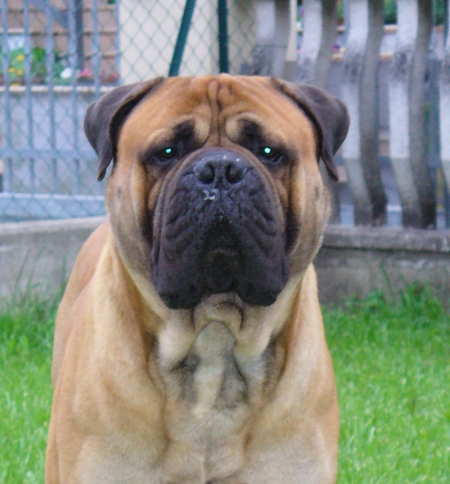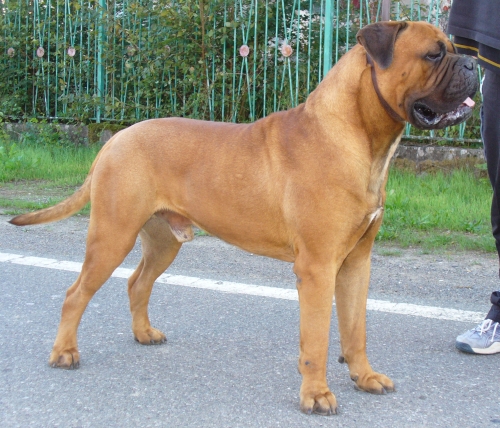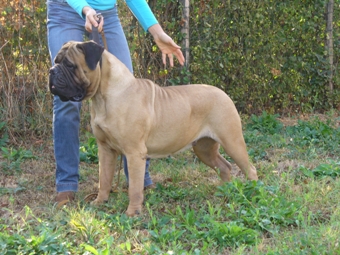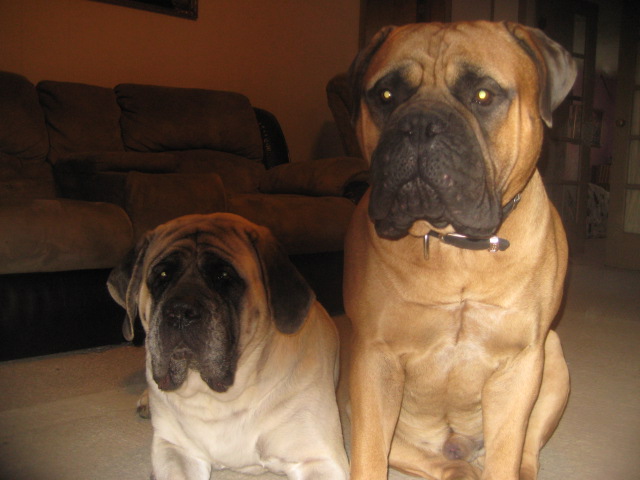|
Watchman
Kennels has been blessed to work in conjuction
with Nik and can carry on some similar type from the
Green Dragon kennels !
Nik
has been
producing
quality
Bullmastiffs for
30+ years & was one of the
original owners of Green Dragon Bullmastiffs, &
has some of the best Bullmastiffs in his line.
Watchman Kennels is very grateful to be a part of what
Nik has worked hard
for over the decades!! Please take notice of the quality
& consistency of the dogs below!!
I've been all over the
United States, Canada, as well as Europe as I
strive to produce the best Bullmastiff possible !
We're
also very blessed to have imported
"CH Faithful
Watchman of the shadows in the dark"
,
Ghibli, and I personally brought back
Matilde to the
States &
have more of these English lines in the works !!
|
CH. CLAYTON IS PICTURED ABOVE & HIS SONS ARE
BELOW |
|

CH. ASSAL |

CH. ILMEN |
BRED BY
SEALAND BULLMASTIFFS
|
AS YOU
CAN SEE, THIS BITCH IS BEING TRAINED TO HIT THE
SHOW RING!
IT'S
MORE THAN TRAINING THAT PRODUCES GREAT
BULLMASTIFFS & THAT'S WHY THIS EUROPEAN
BLOODLINE IS WHAT'S IN SOME OF WATCHMAN'S LINE.
|

|
Does This Answer The Question,
"Do Mastiffs &
Bullmastiffs Get Along With Other
Breeds"?

Is the
Bullmastiff the right breed for you?
The
Bullmastiff is fearless and confident, yet remains
docile and sweet-natured with his family. They are
natural guardians of the home, but do not bark much, as
silence was a virtue when guarding estates. Bullmastiffs
are independent thinkers and may not respond to
traditional obedience training. The breed does not
require much exercise or grooming, and can live happily
in a house or apartment.
General Appearance
That of a
symmetrical animal, showing great strength, endurance,
and alertness; powerfully built but active. The
foundation breeding was 60% Mastiff and 40% Bulldog. The
breed was developed in England by gamekeepers for
protection against poachers.

Size, Proportion, Substance
Size--Dogs, 25 to 27 inches at the withers,
and 110 to 130 pounds weight. Bitches, 24 to 26 inches
at the withers, and 100 to 120 pounds weight. Other
things being equal, the more substantial dog within
these limits is favored.
Proportion--The length from tip of breastbone to
rear of thigh exceeds the height from withers to ground
only slightly, resulting in a nearly square appearance.

Head
Expression--Keen, alert, and intelligent.
Eyes Dark and of medium size. Ears--V-shaped
and carried close to the cheeks, set on wide and high,
level with occiput and cheeks, giving a square
appearance to the skull; darker in color than the body
and medium in size. Skull Large, with a fair
amount of wrinkle when alert; broad, with cheeks well
developed. Forehead flat. Stop--Moderate.
Muzzle--Broad and deep; its length, in comparison
with that of the entire head, approximately as 1 is to
3. Lack of foreface with nostrils set on top of muzzle
is a reversion to the Bulldog and is very undesirable. A
dark muzzle is preferable. Nose--Black, with
nostrils large and broad. Flews--Not too
pendulous. Bite--Preferably level or slightly
undershot. Canine teeth large and set wide apart.

Neck, Topline, Body
Neck--Slightly arched, of moderate length, very
muscular, and almost equal in circumference to the
skull. Topline--Straight and level between
withers and loin. Body--Compact. Chest wide and
deep, with ribs well sprung and well set down between
the forelegs. Back--Short, giving the
impression of a well balanced dog. Loin--Wide,
muscular, and slightly arched, with fair depth of flank.
Tail--Set on high, strong at the root, and
tapering to the hocks. It may be straight or curved, but
never carried hound fashion.

Forequarters
Shoulders--muscular but not loaded, and
slightly sloping. Forelegs--straight, well
boned, and set well apart; elbows turned neither in nor
out. Pasterns straight, feet of medium size,
with round toes well arched. Pads thick and
tough, nails black.

Hindquarters
Broad and muscular, with well developed second thigh
denoting power, but not cumbersome. Moderate angulations
at hocks. Cowhocks and splay feet are serious
faults.

Coat
Short and
dense, giving good weather protection.

Color
Red, fawn,
or brindle. Except for a very small white spot on the
chest, white marking is considered a fault.

Gait
Free,
smooth, and powerful. When viewed from the side, reach
and drive indicate maximum use of the dog's moderate
angulations. Back remains level and firm. Coming and
going, the dog moves in a straight line. Feet tend to
converge under the body, without crossing over, as speed
increases. There is no twisting in or out at the joints.

Temperament
Fearless and
confident yet docile. The dog combines the reliability,
intelligence, and willingness to please required in a
dependable family companion and protector.

History
of The Bullmastiff Dog
Bullmastiffs
were originally bred from English Bulldogs (40%) and
Mastiffs (60%), hence the name Bullmastiffs also known
by some as Bull Mastiffs, as seen by the word
separation.The Bullmastiff was created to be faster and
more aggressive than the Mastiff, yet bigger than and
not as ferocious than the Bulldog. Despite your preference in the spelling of
bull mastiffs, there is no mistaking the appearance of
this breed of dog.The
Bullmastiff’s known history in England begins around
1860, when they were developed to keep large estates and
game preserves free of poachers.

Bullmastiff Dogs as Pets
So you want
to buy a cute little bullmastiff puppy? Did you ever
consider how big that bullmastiff puppy would grow?
Bullmastiffs are a very large breed of dog they are also
known as the Gentle Giants, because of their
astounding size and remarkable gentle and docile
demeanor. If raised with children the bullmastiff will
do quite well. Children still need to be taught to
respect the bull mastiff dog even though the bullmastiff
dogs are quite tolerable of children-just-being-children
of their poking, prodding, pulling of the ears or even
pulling the tail of this massive gentle dog.
Bullmastiff
dogs are a family socialite and love to interact and be
near other family members and pets. A big plus is that
bullmastiff dogs are very protective of the family and
is king of it's domain as it patrols it's territory
keeping everyone safe from un welcomed visitors. Bull
Mastiffs are very weary of strangers and for this reason
alone it makes the bullmastiff dog a number one
choice as a guard dog. Sometimes the
size alone of the bullmastiff dog is enough to make a
stranger do a double take and think twice before
trespassing on your property.
Oh did I
mention feeding bullmastiff dogs??? On the average bull
mastiff dogs will eat anywhere from 24 ounces to 40
ounces of dog food per day. That is nearly 1-1/2 quarts
of dog food.

Bullmastiff Dog Overview
As owners
of Watchman Bullmastiff Dogs there are many reasons why
as a private bullmastiff dog breeder we chose to go with
this type of dog. First of all
we
enjoy the temperament and
size of the Bullmastiff. Their reputation and genuine
love for children means a lot to us since we have four
children of our own. Our children are very active with
all of our dogs.
The
Bullmastiff is a strong and powerfully built animal that
possesses great intelligence and a willingness to
please, making them ideal family companions and
protectors. Although large, the breed remains both agile
and active and is successful in conformation, obedience,
agility, tracking, carting and therapy work. The
Bullmastiff’s coat may be red, fawn or brindle..
Overall the bullmastiff loves to
be with their family even if it is just following you
around while you clean the house. They can also be an
outside dog as long as you give them the required
attention on a daily basis. A fenced in yard or country
setting is good so they can spend their energy away from
your furniture and breakables.
We love our Bullmastiff dogs and
would enjoy answering any questions you may have.
The Bullmastiff is
a very strong and powerfully built canine that possesses
great intelligence and a willingness to please, making
them perfect family companions , protectors & guard
dogs. Thoughthey are very large, the breed remains both
agile and active and is successful in conformation,
obedience, agility, tracking, carting and therapy work.
The Bullmastiff's color may be red, fawn or brindle.
The Bullmastiff's originated in England begins around
1860, when they were developed to keep large estates and
game preserves free of poachers. Game keepers needed a
dog that could track quietly, cover short distances
quickly and knock down and hold poachers without mauling
them. The foundation breeding was 60% Mastiff and 40%
Bulldog; breeders were hoping to create a dog that was
faster and more aggressive than the English Mastiff, yet
more substancial than and not as ferocious as the
Bulldog.
The Bullmastiff is fearless and very confident, yet
remains docile and gentle with his family. They are
natural guardians of the home, and most do not bark
much, as silence was a virtue when guarding estates.
Bullmastiffs are independent thinkers and may not
respond to traditional training. The breed does not
require much exercise or grooming, and can live happily
in a home or larger apartment.
The
Bullmastiff is about 60% of his close cousin the
Mastiff. Still, standing as high as 27 inches at the
withers and weighing between 100 and 130 pounds, this is
still a whole lot of canine. After the first impression
made by the Bullmastiff’s size, it is the large, broad
head that conveys the breed’s essence: the dark eyes,
V-shaped ears that are high-set , and broad, deep muzzle
all combine to present the intelligence, alertness, and
confidence that make the Bullmastiff a world-class guard
dog and family companion. Coats can be fawn, red, or
brindle.
Bullmastiff
puppies are referred to as "cute" and "cuddly" but they
need to be trained at an early age because they will
rapidly grow and sometimes don't know their own weight.
Fortunately they are intelligient and can learn fast
with a consistant strong hand
Early training and socialization are
very important for Bullmastiff puppies. TBullmastiff
puppies are very strong willed, and dogs and owners will
both benefit from training regimens at an early age.
Structure should be put in place early and adhered to as
dogs grow up. Watchman Kennels will encourage new owners
to enroll in local puppy
classes in order to ensure that puppies are
exposed to other , puppies and dogs and that owners have
access to training assistance and information.
Bullmastiff puppies can excel in agility, obedience,
so training should begin immediately and be a part of
the lifelong bond between dog and humans.

Before
You Receive Your Puppy
All of our Bullmastiff puppies are raised in our home with constant
supervision and handling for the first 2 weeks of their
lives. We have 5 children that interact with the
puppies daily which helps the puppies become very
outgoing and well socialized. We also start potty
training the puppies at 3 weeks old and they will be
familiar with a collar and leash. This is highly
important for the new owners so the puppies can adapt
quickly to their new surroundings especially if you plan
to show. We have compliments from past clients on how
well the puppies adapted and veterinarians comment on
how well socialized the puppies are at 8 weeks old.
The puppies will also be vet checked, have their 1st
shots, and be de-wormed before going to their new home.
Our efforts of building a good foundation is intended
for your benefit. As responsible breeders we have the
best interests in mind for you, their satisfied new
owner.
|